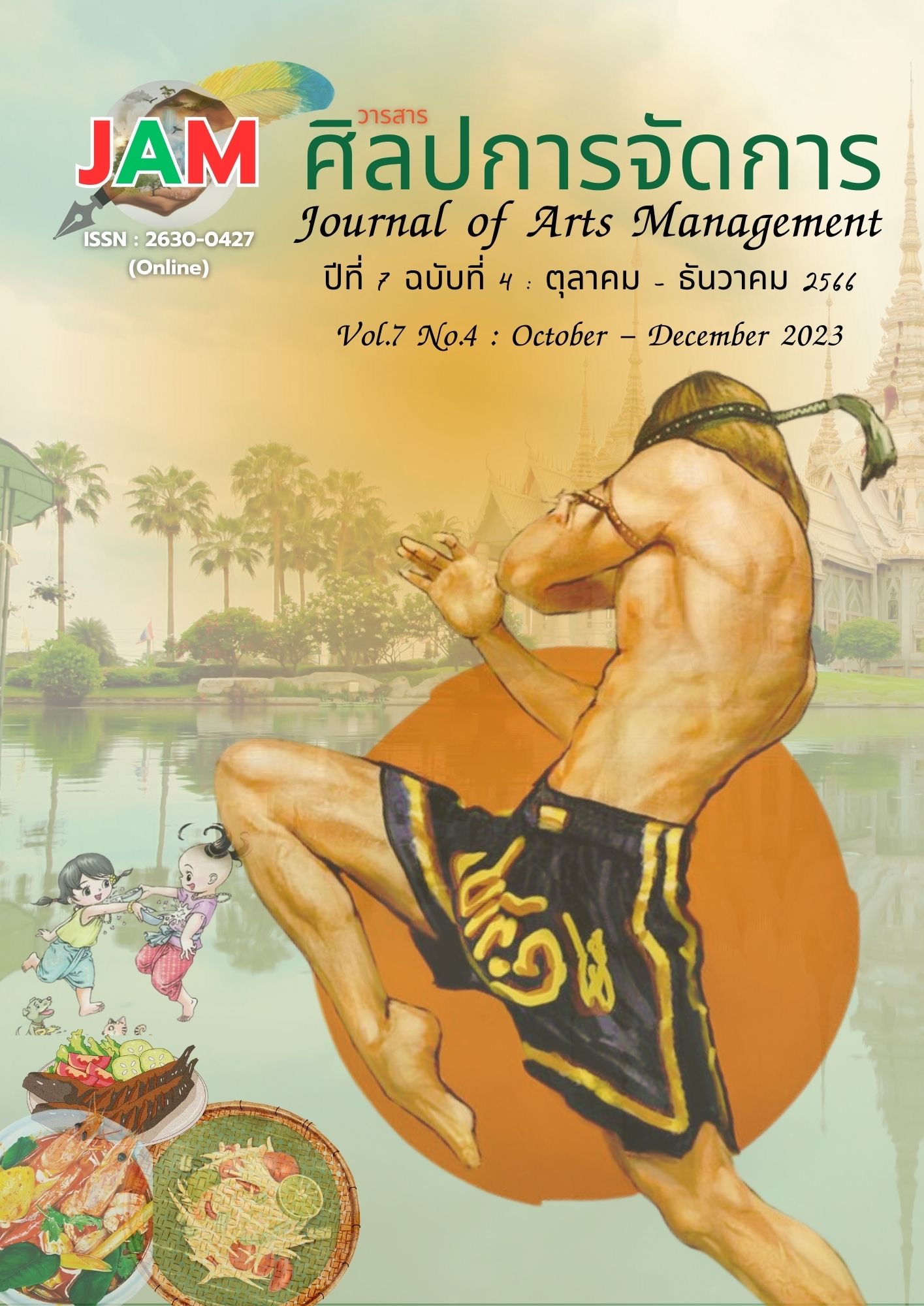Developing an Online Teaching Management Model in Conjunction with Engineering Processes to Promote Computational Skills for High School Student
Main Article Content
Abstract
This Article aimed to (1) study the factors related to online teaching and learning management for high school students during the recent COVID-19 situation. (2) Develop a model for online teaching and learning management in conjunction with engineering processes to enhance computational thinking skills for high school students, and (3) examine the results of online teaching and learning management along with engineering processes to promote computational thinking skills for high school students. The research involved data analysis using statistical methods such as means, percentages, standard deviations, and the comparison of means between two groups. The research findings are as follows: 1) The most influential factors in online teaching and learning management are the teacher's aspect (Mean = 3.75, S.D. = 0.92), the multimedia aspect (Mean = 3.68, S.D. = 0.91), and the assessment and evaluation aspect (Mean = 3.60, S.D. = 0.92). 2) The model for online teaching and learning management consists of four components: (1) teachers and students; (2) lesson content and teaching activities; (3) online learning support materials; and (4) assessment and evaluation of teaching and learning. This model received feedback from five experts. 3) The test results of the online teaching and learning management model along with the engineering process to promote computational thinking skills showed a significant difference in computational thinking skills between the experimental group after learning (Mean = 29.07, S.D. = 1.80) and the pre-learning group (Mean = 14.56, S.D. = 3.52) at a significance level of .05.
Article Details

This work is licensed under a Creative Commons Attribution-NonCommercial-NoDerivatives 4.0 International License.
Views and opinions appearing in articles in the Journal of Arts of Management It is the responsibility of the author of the article. and does not constitute the view and responsibility of the editorial team I agree that the article is copyright of the Arts and Management Journal.
References
Bellanca, J., Brandt, R., Wongkijrug, V., & Jittrarot, A. (2019). 21st Century Skills: Rethinking How Students Learn (3rd ed.). Bookcap.
Department of Medical Services, Ministry of Public Health. (2021). Risk Management Manual in Hospitals during the Outbreak of Novel/Recurrent Respiratory Diseases, 2021. Charoensarnwitthayakarn Publishing Company Limited.
Eisner, E. W. (1976). Education Connoisseurship and Criticism: Their Form and Functions in Educational Evaluation, Journal of Aesthetic Education, 10(3/4), 135-150. https://doi.org/10.2307/3332067
Hathayamattayak, M. (2022). Characteristics of School Teacher in Digital Transformation Scenarios. Journal of Bovorn Multi-Education and Human Social Sciences, 2(2), 18-24. https://so03.tci-thaijo.org/index.php/JOB_EHS/article/view/258865
Hutamarn, S., Chookaew, S., Wongwatkit, C., Howimanporn, S., Tonggeod, T., & Panjan, S. (2017). A STEM Robotics Workshop to Promote Computational Thinking Process of Pre-Engineering Students in Thailand: STEMRobot. https://www.researchgate.net/publication/322077301_A_STEM_Robotics_Workshop_to_Promote_Computational_Thinking_Process_of_Pre-_Engineering_Students_in_Thailand_STEMRobot
Kaniemee, S. (2017). Using Engineering Design Processes to Foster Creativity and Problem-Solving Skills[Master's Thesis, Mahasarakham University].
Khan, B. H. (2017). E-Learning Design: Evaluation Checklist. NEO-POINT (1995).
Kuttanan, K., Thippayanuruksakul, K., Chanthawat, T., Sitti, T., Wanaphiphatphong, P., Lonan, W., Kaewurai, R., & Meesuwan, W. (2023). Thai Teachers and Readiness for Online Teaching. T-VET Journal, 7(13), 18-36. https://so01.tci-thaijo.org/index.php/TVETJournal_IVEN3
/article/view/251396
Liaw, S. (2007). Computers and the Internet as a Job-Assisted Tool: Based on the Three-Tier Use Model Approach. Computers in Human Behavior, 23(1), 399-414. https://doi.org/10.1016/j.chb.2004.10.018
Ng, D.T.K., Reynolds, R., Chan, H.M.Y., Li X.H., & Chu, S.K.W. (2020). Business (Teaching) as Usual Amid the Covid-19 Pandemic: A Case Study of Online Teaching Practice in Hong Kong. Journal of Information Technology Education: Research, 19, 777-802. https://doi.org/10.28945/4620
Nkoala, S., & Matsilele, T. (2023). The Influence of The Digital Divide on Emergency Remote Student-Centered Learning During The COVID-19 Pandemic: A Case Study of Journalism Education. SN Social Sciences, 3(3), 47. https://doi.org/10.1007/s43545-023-00626-6
Office of the Basic Education Commission. (2017). Indicators and Core Learning Content: Science Learning Area (Revised Edition 2017) following the Fundamental Education Core Curriculum, B.E. 2551. Office of the Basic Education Commission.
Office of the Secretary-General of the Education Council. (2017). National Education Plan (B.E. 2560-2579). http://www.onec.go.th/index.php/page/view/Outstand/2532
Rim, H. (2015). A Study on Teaching using Website 'Code.org' in Programming Education based on Computational Thinking. Journal of Korea Multimedia Society, 20(2). 382-395. http://koreascience.or.kr/article/JAKO201712835100539.page
Rodriguez, B. R. (2015). Assessing Computational Thinking in Computer Science Unplugged Activities [Master's Thesis, Colorado School of Mines]. https://repository.mines.edu/handle/11124/169998
Srisa-ard, B. (2013). Statistical Methods for Research (5th ed.). Suwiriyasan.
Stephenson, J. E., Tempest, H. G., Griffin, D. K., Mileham, A., & Payne, A. M. (2007). The Use of An E-Learning Constructivist Solution in Workplace Learning. In ECCE '07: Proceedings of The 14th European Conference on Cognitive Ergonomics: Invent! Explore!, 133-138. https://doi.org/10.1145/1362550.1362577
Syukri, M., Soewarno, S., Halim, L., & Mohtar, L. E. (2018). The Impact of Engineering Design Process in Teaching and Learning to Enhance Students’ Science Problem-Solving Skills. Journal Pendidikan IPA Indonesia, 7(1), 66-75. https://journal.unnes.ac.id/nju/index.php/jpii/article/view/12297
Wing, J. M. (2006). Computational Thinking. Communications of the ACM, 49(3), 33-35. https://cacm.acm.org/magazines/2006/3/5977-computational-thinking/abstract#


